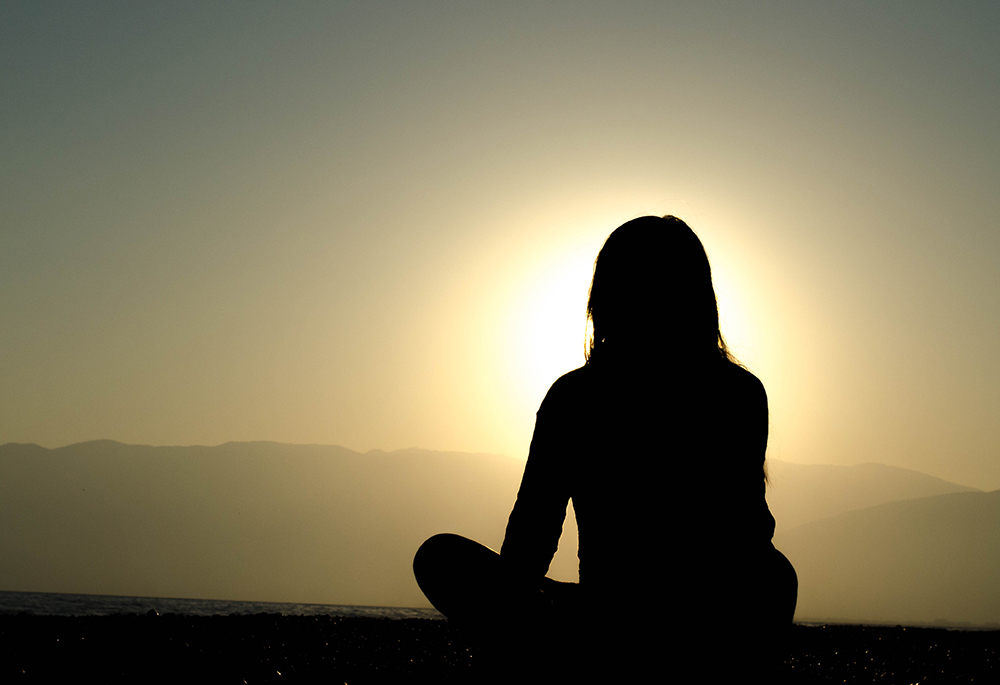
(Unsplash/Dingzeyu Li)
I lit a candle and pressed "play" on a prayer app on my phone. I sat cross-legged on my bedroom floor in front of an icon of Jesus. The city noises — a siren, a bus, a train — seem hushed in the background. To anyone peeking in on the scene, it probably would look as if a modern Franciscan Sister was praying in a quiet bedroom.
Quiet, though, was far from what I felt. My mind was jumpy, my thoughts racing through things I wanted to remember: people, tasks, requests for prayer that had recently been sent my way. Although the meditation audio buzzed out of my phone, I wasn't listening. My throat, chest, back and belly were tight.
Later that morning, I logged into a virtual one-on-one work meeting and gazed into a screen, seeing a colleague and friend. I said "How are you?" to my coworker and saw a frown, tears, a wrinkled brow. I offered my friend space to share what she needed and then we threw out our agenda, and got talking about what mattered most. We spoke about how tough it can be to be present to others who are suffering, when we're struggling too. We discussed how hard it is to know what is needed nowadays, when nothing seems predictable except the inevitability that we'll struggle with more ambiguity.
I wonder if you've had conversations like this too. All of us are dealing with the heaviness of grief and ongoing adaptability during this COVID-19 pandemic. As sick as we are of Zoom rooms, facemasks and hybrid meeting models, we've also learned the advantages of taking precautions during a pandemic. At the same time, practically every system and structure — how we worship, engage in democracy, gather and work — is breaking down or shifting. We are lost. We are tired. We all feel this, not just the two of us who were at the meeting. But yet, a lot of us feel alone, and the loneliness is killing us too.
During the conversation with my friend, we wondered if our ancestors were tormented by mental illness during the influenza pandemic of 1918-1920. We surmised that they weren't, because today we seem to be lonelier, more fragmented, more stressed. Those who lived through previous pandemics may have been better at tending to their communities and listening to their hearts.
Advertisement
I believe that we all carry a deeper wisdom within us, an ability to know what's true, right and needed. Some may say our deeper wisdom is the channel within that helps us tune into God's voice — others say this wisdom is God.
It's not easy to tune into our hearts. From advertisements to the blinking of our phones, we're inundated with all sorts of racket competing for attention. We feel a pressure to produce, cross tasks off our to-do lists and pay our bills; listening to that sacred voice deep within is often the last thing on our minds.
In my roles as spiritual director, vocation minister and podcaster, I spend a lot of time exploring possibilities with people who want to listen to their deeper wisdom. I have developed a list of spiritual practices that can strengthen the fatigued and lonely, no matter who you are.
Take a sabbath. The command to unplug and reset our focus is biblical (Exodus 20:8-11). Whether you do it one full day a week or for one-seventh of your time each week, each moment that you allow your body and mind time to relax invites restoration. Intentional breathing and meditation has even been scientifically proven to strengthen our bodies. The wisdom of taking sabbath time is apparent in the resonance and popularity of The Nap Ministry. Its founder Tricia Hersey is a community organizer who personally knew the injustices connected to exhaustion and overworking. On her website, she invites us all to "disrupt and push back against a system that views you as a machine. You are not a machine. You are a divine human being." Hersey is a popular prophetic voice because she expresses what a lot of us are intuiting: we need rest.
Claim your need for balance. Speaking of not being disposable, the "Great Resignation" occurring in practically every workplace reveals that we are connected in our frustrations — and our wisdom. As institutions and systems break down and shift, we are collectively claiming our dignified need for balance and restoration. As explained on CNBC Make It by Anthony Klotz, a psychologist and professor at Texas A&M University who coined the phrase in May 2021, the Great Resignation is "not just about getting another job, or leaving the workforce, it's about taking control of your work and personal life, and making a big decision — resigning — to accomplish that. This is a moment of empowerment for workers."
Lean into community. We are relational creatures, made to give and receive. We are designed to be interdependent (not independent) and much healing and restoration comes from what others give us. Although it's trendy to claim time for self-care, community care can offer us a deeper strength. In community, we learn that our views and voice matter — that our existence matters. To value the collective more than oneself is a resistance to the damaging "pull yourself up by your bootstraps" mentality that insists that our strength to survive must come from one's self. But our human experience shows us that we are made to rely on each other from birth to death. So instead of tending to ourselves when we are struggling, we can ask for help and receive it, take in a compliment, receive encouragement, ask someone to go for a walk or call a friend and share what's on our minds. In the workplace, offering community care to others means nonjudgmentally stepping forward and pitching in on projects so that others can take time off.
Get out your crayons. Most of us have invented new structures before — at times entire worlds. When we were children, many of us could cope with a lot of complicated and confusing feelings by engaging in play, imagination and creativity. When we allow ourselves the freedom, time and space to doodle, make music, create art, cook, write and invent, we're engaging the nonjudgmental part of our human spirit. Embracing this part of who we are puts us in touch with another an element of our Divine nature. Connecting to the wisdom and coping strategies we knew when we were young can help us connect with our wisdom now.
Spiritual practices are pathways to the place within us that contains our deep wisdom, the guide that helps us navigate human struggles. Whether they are worked into the rhythms of daily life or something we try occasionally, each effort offers renewal to our tired and lonely hearts. Through each contemplative act—sabbath, balance, leaning into community, playful creativity — we build the world for which we yearn.







